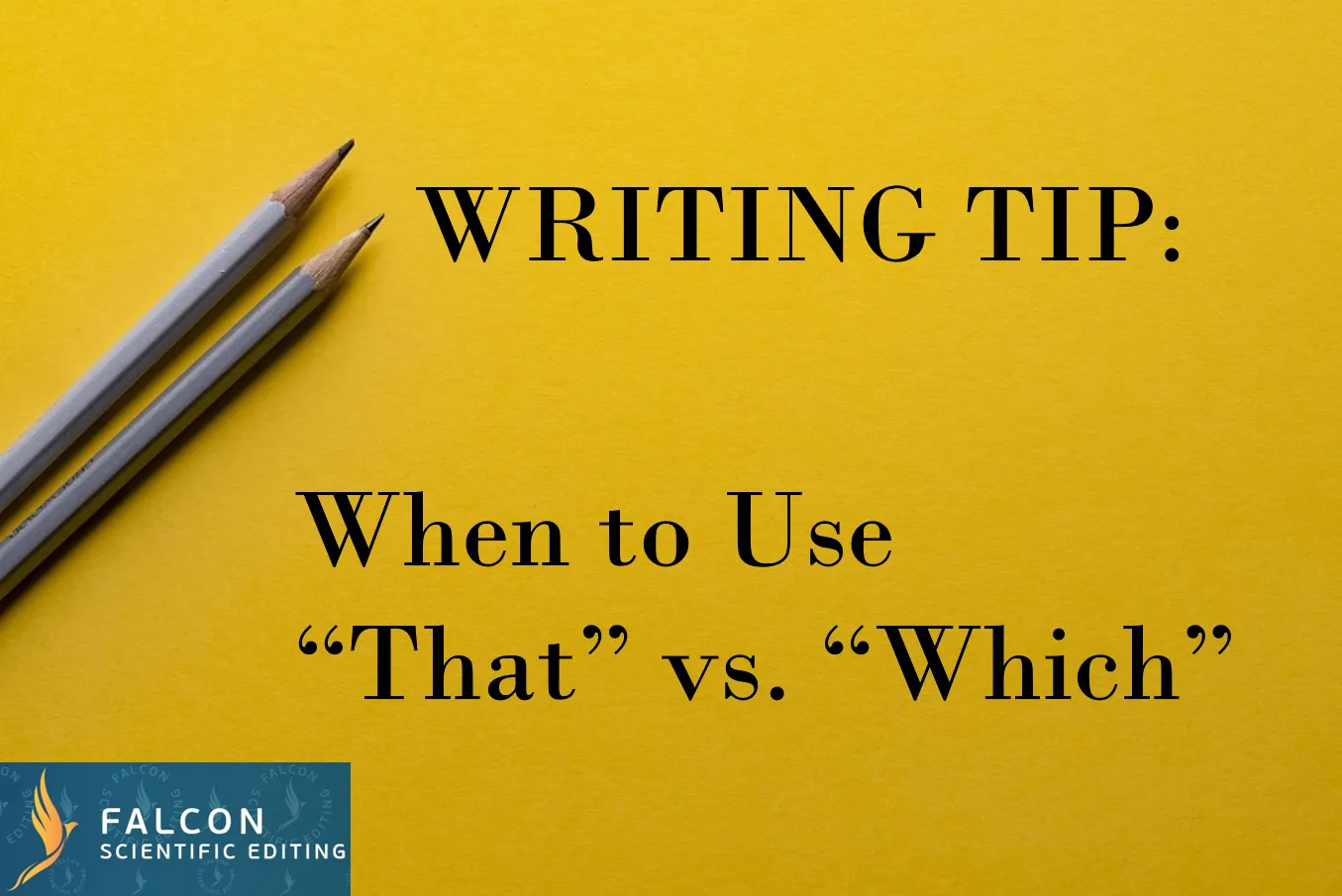Writing Tip: When to Use “That” vs. “Which”
Alyssa Colton, Ph.D. | Jan. 5, 2018

Deciding on whether to use “which” or “that” is something many writers and researchers struggle with, and our customers often ask for writing tips on this topic. While there may not seem to be much difference between these two little words, they have different uses, and this is grammar topic that has specific rules that you should be aware of when proofreading your own scientific article.
Grammatically, “that” is usually used with a restrictive clause, and “which” is usually used with a non-restrictive clause. Simply put, this means that the phrase following “that” needs to more specifically identify something, whereas the phrase following “which” elaborates on something and can be easily taken out without affecting the meaning. In most cases, commas are used to set off “which” clauses but not “that” clauses. Both "that" and "which" are relative pronouns but they are used in different ways.
Here are a few examples of when to use “that”:
In the following sentence, the second use of “that” specifies that certain types of automated photolithography tools can be used to eliminate defects:
We expect that one can significantly improve the fabrication yield by using automated photolithography tools that can eliminate most of the defect sources. (Luan et al.)
A common use of “that” is in a sentence with a question, demand, command, suggestion, wish, or request. In the first example given above, the first “that” would fall into this category because it is preceded by “expect.”
In the next example, the “that” specifies certain differences that come about during a certain age:
Some experts have traced the relatively low share of blacks and Hispanics working in STEM professions to differences
that
emerge at an early age.
(Anderson)
Receive Free Grammar and Publishing Tips via Email
Some more examples of using “that” in a sentence:
The subject said that she was feeling tired.
Note that you could also simply write: “The subject said she was feeling tired.”
The reviewers recommended that the experiment be replicated.
By comparison, 45% of whites, 40% of Hispanics and 39% of blacks say they want a science-related job, and no more than half of these respective groups agree that they need to do well in science to get the kind of job they desire. (Anderson)
Here are a few examples of when to use “which” to add more information:
Conventional neural implants have volumes and surgical footprints considerably larger than those of cells and capillaries, which induce substantial damage and disruption to local cellular and vascular networks. (Luan et al.)
Note that the clause that follows “which” adds more information about the neural implants. This new information is NOT essential to the main part of the sentence. Here’s another writing example of when to use “which”:
Recently, gene transfection into target cells using naked DNA, which is a simple and safe approach, has been improved by combining several physical techniques. (Niidome & Huang)
In the above example, the writers are giving more information about this procedure, not restricting the type of procedure.
Informal vs. formal writing
In informal speech and writing, “that” is sometimes used when “which” and “who” should be used; however, in formal written English, the above rules should be followed.
Here’s an example of how something might be changed from less formal to more formal:
Informal: The archeologist that made the discovery was on the news last night.
Formal: The archeologist who made that discovery was on the news last night.
When choosing between the relative pronouns “that” and “which,” ask yourself the following questions when checking your journal article:
1. Is the clause that follows “that” or “which” restricting or defining the subject or object in any way? If so, it probably needs “that.”
2. Is the clause that follows “that” or “which” just adding more information about the subject or object? If so, it probably needs “which.”
3. If “that” is merited, but it doesn’t qualify as #1, does it follow one of the types of verbs listed? If so, you might try rewriting it without it. In addition, make sure you are not using the less formal version of “that.”
We hope these writing tips about the differences and when to use “that” vs. “which” in your scientific article have been helpful.
Do you have specific questions about a sentence in your paper? Do you have other questions about relative pronouns?
Message us today and ask for free!
You may also like our other original articles on grammar topics:
5 Common Grammar Mistakes Scientists Make in Publications
The Proper Use of Articles in English Writing
Comments or Suggestions?
Complete our Blog Feedback Survey and Receive 10% Off Your Next Order!
Works Cited
1. Anderson, M. “Among High School Seniors, Interest in Science Varies by Race, Ethnicity.” FactTank: News in the Numbers. Pew Research Center. 4 Jan. 2017. Accessed 28 Feb 2017.
2. Luan, L., et al. “ Ultraflexible Nanoelectronic Probes Form Reliable, Glial Scar-free Neural Integration.” Science. AAAS. 17 Feb 2017. Accessed 28 Feb 2017.
3. Niidome, T and L. Huang. “Gene Therapy Progress and Prospects: Nonviral Vectors.” Abstract. Gene Therapy 9.24 (Dec 2002): 1647-52. ProQuest. Accessed 28 Feb. 2017.
References
1. Keck, R. and Angeli, E. “Introduction and General Usage in Defining Clauses.” Purdue Online Writing Lab. Purdue University. 13 Feb. 2013. Accessed 28 Feb 2017.
2. Toews, Myron L. “The Grammar Hammer: Common Mistakes in Scientific Writing.” PowerPoint. October 2012. Creighton University School of Medicine.
About the Author:
 Dr. Alyssa Colton has a Ph.D. in English from the University at Albany, State University of New York (SUNY). She has taught and worked with students of all levels and backgrounds on writing skills for 20 years. She is a freelance writer and editor specializing in science, health, productivity and career development.
Dr. Alyssa Colton has a Ph.D. in English from the University at Albany, State University of New York (SUNY). She has taught and worked with students of all levels and backgrounds on writing skills for 20 years. She is a freelance writer and editor specializing in science, health, productivity and career development.
Topics : Grammar Scientific Writing
